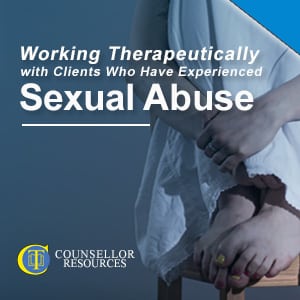Sexual Abuse
Preparing Yourself
Sexual abuse is a very heavy and difficult topic to hear about from a client. To cope with this, we need to be resilient, and to protect ourselves from being damaged by what we hear.
In its Ethical Framework for the Counselling Professions, the BACP (2018: 11) defines resilience as ‘the capacity to work with the client’s concerns without being personally diminished’.

Your personal support systems may include:
- personal therapy
- clinical supervision
- family and friends
- leisure activities
- your faith (if you have one)
- limiting the number of clients with heavy material.
In particular, it’s also important to consider your own experience and view on sex, and any experience you might have had (either yourself or through a loved one) with abuse.
If there may be parallel process, you need to have worked through your own experiences very thoroughly before taking on a client with similar issues.
Watch this Lecture + Access Hundreds of Hours of CPD
Certified CPD for Qualified Counsellors
- Hundreds of hours of on-demand CPD lectures to help you stay current with your CPD ethical requirements
- Support, and be supported, by thousands of other counsellors as a member of the exclusive online community.
- Access your learning anytime you want ... anywhere you choose ... using any device type — desktop or mobile.

Also, it’s vital to look at your own attachment style, especially as – even having worked to change an insecure style to a secure one – we can revert when under pressure.
For example, if you both you and the client have a naturally avoidant attachment style, you could feel the client isn’t fully involved in the relationship and react by pulling away from them.
Or if you have an ambivalent attachment style, the client may withhold material, thinking that you can’t handle it or be of any use to them.
Points to Watch for in Clients
Do keep your eyes open for transference and countertransference.
Also, clients presenting with this type of material may use projection, resorting to the same mechanisms that helped them survive communication with their abuser (e.g. disassociation, self-blaming and even flirting).
Anger may come up, so that you may be seen as representing everybody that didn’t help them in the past.
There are various common traits in survivors of sexual abuse, often relating to behaviour patterns:
- drug-taking or excessive use of alcohol (either because they were given drugs as a way of making them compliant or because they are trying to forget what happened)
- sleeping around (having being ‘sexualised’: conditioned by an abuser)
- prostitution (having been told by an abuser that sexual activity is all they are good at)
- self-harm
- multiple abortions
- extreme sexual practices (e.g. sadomasochism)
- returning to the abuser (due to trauma bonds or Stockholm syndrome).
Sociological Context
Societal values relating to abuse have changed over time, and survivors are judged through the prevailing prism of societal values, both now and in the past.
As recently as the late-1990s, child sexual abuse was tolerated – or at least politely ignored – by certain sections of society. We can see this in the case of Jimmy Savile, who – despite being very much in the public eye through his fame – got away with abusing children for many years.
Possible reasons for this include incompetence, duplicity, attribution error (explaining behaviour based on internal factors such as personality and disposition, and underestimating external factors such as situational influences).
Examples of attribution error would be the idea of willing ‘child prostitutes’ (an impossible concept in the UK, given the law) or of children ‘asking for it’.
The NSPCC has published statistics on child abuse. Many commentators are saying that this is only the tip of the iceberg, and it may be that more and more cases will come to light as time goes on.
Psychological Context
While every person is of course unique, clients may feel guilt and shame about:
- not fighting back or not running away
- going back to their abuser (through trauma bonding)
- not asking for help
- waiting too long to report the abuse
- being unable to protect a sibling
- having somehow ‘asked for it’ (e.g. through what they were wearing)
- experiencing pleasurable sensations while being abused (due to natural biological responses).
Physiological Processing of Trauma
Zoe Lodrick (a psychotherapist who specialises in working with clients who have experienced rape, sexual assault or sexual abuse) describes the natural process we go through when under attack:
- Friends: we look for help.
- Fight or flight: we assess whether we can overcome or outrun the predator.
- Freeze: if we believe we can’t overcome or outrun them, we keep very still (based on the concept of playing dead in the animal world, hoping we won’t be seen or will no longer be of interest).
- Flop: the amygdala and the part of the brain that deals with memory become flooded with cortisol (secreted by the kidneys) and switch off the brain, protecting it through disassociation.
We must show that we are resilient enough to hear what they need to say to us, showing empathy while not appearing shocked to the point of being overwhelmed ourselves.
Free Handout Download
Working with Sexual Abuse
Post-Traumatic Stress Disorder (PTSD)
When someone is suffering from PTSD, any reminder of the traumatic situation can make them feel like they’re right back there – as if it’s really happening now. These are sometimes known as ‘flashbacks’ – and could occur in the therapy room.
Sometimes, these flashbacks cause body sensations. This means that clients may re-experience the pain of the abuse. Psychiatrist Bessel van der Kolk has written an excellent book on this, entitled The Body Keeps the Score (Penguin, 2015).
Alternatively, people who have experienced trauma may dissociate, as a defence mechanism.
This can mean they have only fragmented images of the event, with no clear timeline of it – because the stress hormone in the brain stopped the brain from laying down memories.
It can make it hard for people affected by sexual abuse to give clear evidence in court.
Useful Interventions
Many children who have been subject to sexual abuse have found that the adults they trusted to tell have not believed them – perhaps because they could not handle the truth.
It is vital therefore for us – as counsellors – to accept the client, avoiding any scepticism or other indication that we don’t believe them.
Similarly, we must show that we are resilient enough to hear what they need to say to us, showing empathy while not appearing shocked to the point of being overwhelmed ourselves.
Sometimes, we need to use psychological education to give the client facts – backed up with evidence – to help them understand why they reacted as they did to being abused.
It can remove a huge amount of anxiety from the client if you can say to them: ‘It’s not your fault. Your body responded in the way it was designed to.’
Similarly, we need to help clients to see that they couldn’t possibly have ‘asked for it’.
Some clients may not want to visit certain memories – so we need to tread very carefully when working with clients who are talking about abusive events.
Do be careful not to try to ‘fill in any gaps’ yourself, as this could create false memories. This would not be in the service of the client – and could lead to difficulties for you if this becomes evident in court.
If you suspect that a client has dissociated in the therapy room – perhaps staring into the distance unresponsively – try holding up three fingers and asking: ‘How many fingers am I holding up?’
This engages the thinking part of the brain very gently, so taking the client out of the trauma-focused part of the brain and bringing them back to the here and now.
Dos in Working with Sexual Abuse
- Listen with your full attention from the very start.
- Use questions only to
- Be patient: trauma work can take a lot of time.
- Be the adult – consistent and stable.
- Be clear it’s the abuser who’s in the wrong, helping the client see that they certainly didn’t ‘ask for it’.
- Be aware that clients may not have the emotional vocabulary for what they’ve experienced: be attentive to body language and other ways in which the client may be expressing their feelings.
- Validate their experiences (as another human being for them to share their burden with).
Don’t be afraid of sharing your own reaction to the material or to your client’s processing of it. Sometimes, counselling students and new counsellors think that it’s unprofessional to share their own feelings – but doing so is really important, to avoid withdrawing from the therapeutic relationship or burning out.
Don’ts in Working with Sexual Abuse
- Don’t ask lots of questions: just listen and be present.
- Don’t rescue.
- Don’t challenge the client’s story, or any apparent inconsistency in it (which could be due to fragmentation).
- Don’t ever ask for details of the abuse (as this could re-traumatise the client).
- Don’t work with thoughts over emotions: it’s the feelings that really matter.
- Don’t ask who the abuser is or was (that is for the police, whereas our role is to help the client heal from the wounds of abuse).
Using Clinical Supervision
Last but by no means least, high-quality supervision is vital – in all counselling but especially so when working with heavy material like sexual abuse.
Supervision has three key elements:
- normative – maintenance of professional standards
- restorative – support and stress reduction
- formative – skills and knowledge development.
Before going to supervision, think about what you want from it: perhaps information, support, clarification on ethics? It can be helpful to make a note of this as an aide-memoire for when you’re there.
Don’t be afraid of sharing your own reaction to the material or to your client’s processing of it.
Sometimes, counselling students and new counsellors think that it’s unprofessional to share their own feelings – but doing so is really important, to avoid withdrawing from the therapeutic relationship or burning out.
If you’re feeling overwhelmed, don’t be afraid to tell your supervisor.
Free Handout Download
Working with Sexual Abuse